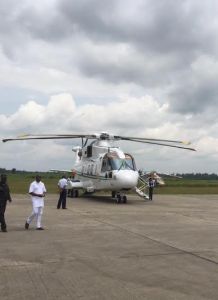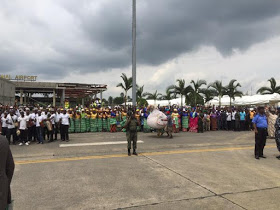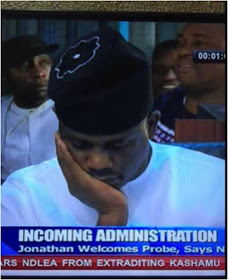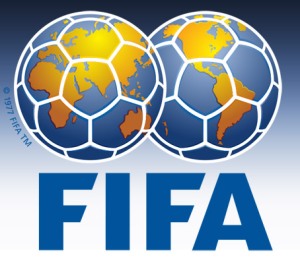In a sandy compound in the Niger desert town of Agadez, a white-turbaned imam blesses a circle of African migrants, some of them little more than boys, to protect them on the journey across the Sahara toward Europe.
A smuggler then gives a signal and the migrants scramble onto a white Toyota Hilux, jostling for a place on the 1,200-km journey to Sabha in southern Libya – a route plagued by bandits and the pitiless desert sun.
Nineteen men pack into the truck for the three-day ride. Those on the edge sit astride a long wooden stick, to prevent them falling off during the night into the Sahara.
Some 2,000 migrant deaths in Mediterranean waters between the Libyan and Italian coasts this year have prompted European governments to tighten maritime patrols to stem an influx of migrants in boats from Libya, which has been in widespread chaos since rebels toppled Muammar Gaddafi in 2011.
Yet the International Organization for Migration (IOM) warns that at least as many migrants may die during the long desert crossing from Niger, the main staging post for West Africans seeking to cross the Mediterranean.
Despite Niger's passage of a tough new law against people trafficking, some 100,000 migrants fleeing desperate poverty at home in hopes of a better life in Europe are expected to cross the West African state's borders this year. Many will pass through smugglers compounds known as “ghettos”.
“It's a bit frightening but I have to deal with it because in life you have to be brave,” said migrant Fousseni Ismael, 16, wearing a blue headscarf to protect him from the sun as he waits to board a truck.
As night falls, the pickup rolls out of the metal gates of the compound and snakes through the sandy backstreets of Agadez, passing groups of Muslim men knelt in the evening prayer. It drives unhindered past a police checkpoint on the outskirts of town and into the blackness of the vast desert.
The risks are high. Mohamed, a driver, said he was attacked last week by Touareg bandits wielding AK-47 assault rifles who opened fire on his pickup when he refused to stop, wounding a migrant in the leg.
For protection, scores of trucks follow a military convoy that heads north each Monday toward the oasis town of Dirkou.
The death of 92 migrants from thirst — mostly women and children — when their vehicle broke down en route to Algeria, to Libya's west, in 2013 prompted Nigerien authorities to briefly crack down on the corridor — but the lucrative trade quietly returned.
“The desert has always been a cemetery for immigrants, in silence and complete indifference. Travelers tell us they often find bodies – skeletons ravaged by the sands,” said Agadez Mayor Rhissa Feltou.
NOTHING WORKS BUT SMUGGLING
Smuggling has long been a way of life in Agadez, an ancient caravan town. The streets are full of cars stolen from Libya, whose borders are largely unsecured, and locals speak in hushed tones of drug convoys that traverse the desert.
This month's law, approved under pressure from European Union donors, includes sentences of up to 30 years in prison for those profiting from migrants.
But with the collapse of foreign tourism due to the rise of armed Islamist groups in the Sahara, smugglers say there is nothing much else they can do to earn money.
The law has prompted smugglers in Agadez to hide their operations, but there is no sign of the migrant flow subsiding.
“The ghettos? You cannot count them on the fingers of your hand. Everyone is doing it because it is the only thing that works,” said David Ousseni, 34, who runs the compound.
“We give people a place to rest before they leave. As soon as we have a full cargo of people, we call a driver,” he said.
People smuggling brings millions of dollars to Agadez. The 30 or so men leaving from Ousseni's “ghetto” paid 150,000 CFA francs ($250) each to travel to Sabha.
Including food, lodging and bribes, migrants will spend some 250,000 CFA francs just to cross Niger, he said.
Lamine Bandaogo, a 17-year old from Burkina Faso, said police extorted money from migrants at checkpoints during the bus journey from Niger's capital Niamey to Agadez, demanding up to 10,000 CFA francs to let them pass.
Although West Africans have the right to travel freely in Niger, many migrants refuse to show their documents for fear they will be confiscated by police.
Bandaogo has seen migrants dying at sea on television, but would rather risk his life than face grinding poverty at home.
“We have seen that but what can we do? Everyone has their destiny. You don't know where you are going to die,” he said.
SMUGGLING BREEDS CRIME
A 2013 police report seen by Reuters identified at least 70 ghettos in Agadez, many of them segregated by nationality for travelers from Nigeria, Senegal, Ghana or Mali and operating with the complicity of local security forces.
Many of the ghettos lie in dirty backstreets, in squat houses behind red mud walls with no windows, only metal gates that occasionally offer glimpses of young men inside.
Some smugglers are themselves migrants who ran out of money and started working for a network to earn enough to continue their journey.
For those who reach Libya, conditions can be even worse. Migrants tell stories of being imprisoned by smugglers until their families back home transfer a ransom for their release.
“In Libya, you see it all. The smugglers demanded my friend to give them money, he refused and so they took out a pistol and shot him,” said Nfamara Diawara, 36, who is headed back to his native Senegal after failing to make enough money in Libya.
An IOM transit center in Agadez for returning migrants has received around a dozen people with broken limbs or with bullet wounds, according to its director, Maliki Hamidine.
Giuseppe Loprete, director of IOM's Niger branch, said smugglers sometimes inflict physical and sexual abuse on migrants and often abandon them to death in the desert if they cannot stump up more money to continue their journey.
Feltou, the mayor of Agadez, said people smuggling was fuelling crime and social problems including banditry, drug trafficking and prostitution in the town.
Amina, a 26-year-old from Nigeria, said she was working in Agadez as a prostitute until she could raise enough money to return home to start a business.
“If I ever go to Europe, I will fly,” said the mother of two, her hair in a net, as she sat in a courtyard in front of a low-slung, red mud-brick building. “I am afraid of the desert and of the water. Too many people die.”
Reuters
Like us on Facebook- www.facebook.com/agbotrends
we trend, we promote, we feature














